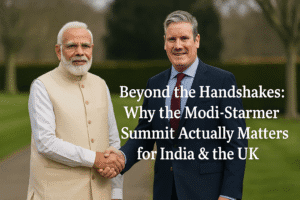Beyond the Handshakes: Why the Modi-Starmer Summit Actually Matters for India & the UK
India and the UK have significantly elevated their strategic partnership beyond symbolism through concrete agreements forged at the Modi-Starmer summit. The landmark Comprehensive Economic and Trade Agreement (CETA) aims to fundamentally reshape bilateral commerce, boosting investment and job creation while streamlining professional mobility. Crucially, a pioneering Defence Industrial Roadmap commits both nations to jointly design, develop, and manufacture advanced weaponry, moving decisively beyond a simple buyer-seller relationship.
Simultaneously, the accelerated Technology and Security Initiative deepens collaboration on critical frontiers like AI, semiconductors, and biotech, addressing shared economic and security challenges. The tangible “living bridge” strengthens as UK universities establish campuses in India, embedding educational ties. Anchored by the ambitious India-UK Vision 2035, this summit marks a deliberate, practical shift towards integrated cooperation, whose true success now hinges on sustained implementation across trade, tech, defence, and knowledge exchange.

Beyond the Handshakes: Why the Modi-Starmer Summit Actually Matters for India & the UK
The carefully manicured lawns of Chequers witnessed more than just diplomatic pleasantries this week. Prime Minister Narendra Modi’s visit to the UK, hosted by newly elected PM Keir Starmer, wasn’t merely a change of guard photo-op. It marked a deliberate, substantive acceleration in a relationship both nations clearly see as pivotal for their futures. Here’s why the outcomes matter:
- CETA: Not Just a Trade Deal, But a Strategic Recalibration: The landmark Comprehensive Economic and Trade Agreement (CETA) is the headline, but its significance runs deeper. It signals a shared ambition to move beyond traditional trade patterns. For the UK, post-Brexit, securing a deep partnership with the world’s fastest-growing major economy is crucial diversification. For India, access to the UK’s advanced services, technology, and investment bolsters its own growth trajectory. The focus on reducing operational costs via a planned Double Contribution Convention specifically targets the massive services sector and skilled professionals – the bedrock of modern economic exchange. Modi’s push to link GIFT City with London’s financial ecosystem underscores a vision for integrated capital markets, not just goods exchange.
- Defence: From Buyer-Seller to Co-Creators: The Defence Industrial Roadmap is arguably the most transformative outcome. Moving beyond India as a customer and the UK as a supplier, this pact commits both nations to joint design, development, and manufacturing. This isn’t just about cost-sharing; it’s about leveraging India’s scale and manufacturing prowess with British R&D and niche technology. The goal of producing for domestic needs and global markets positions this partnership as a potential counterweight in the competitive defence export landscape and enhances strategic autonomy for both.
- Tech & Security: Securing the Future, Together: The accelerated Technology and Security Initiative (TSI) tackles the defining challenges of this century. Collaboration on AI, quantum, semiconductors, biotech, and critical minerals isn’t optional – it’s essential for economic security and global influence. This formalized framework moves beyond ad-hoc cooperation, creating a structured channel to navigate the complex geopolitics of tech, build resilient supply chains, and set standards. The CBI-NCA MoU on tackling crime, coupled with strong statements on counter-terrorism, reflects a mature understanding that shared security threats demand shared solutions.
- The “Living Bridge” Gets Stronger Foundations: While celebrating the Indian diaspora’s contribution is customary, concrete steps like UK universities (Southampton first, more expected) establishing campuses in India under the NEP framework materially strengthen this bridge. This isn’t just about student mobility; it’s about embedding institutional partnerships, fostering joint research ecosystems, and creating talent pipelines aligned with future economic needs. It transforms the diaspora from a cultural link into an active, two-way conduit for knowledge and innovation.
- Vision 2035: A Blueprint, Not a Wishlist: The India-UK Vision 2035 provides the essential scaffolding. Covering economy, tech, defence, climate, health, and people-to-people ties, it moves the relationship from reactive to proactive. It sets a decadal horizon, forcing bureaucracies on both sides to plan beyond political cycles. This long-term commitment is the bedrock upon which the specific agreements on trade, defence, and tech are built.
The Human Insight: Why Should You Care?
- Businesses (Both Sides): CETA means new markets, smoother operations, and potentially lower costs. The defence roadmap opens doors for SMEs in supply chains. Tech collaboration offers R&D partnerships and access to cutting-edge innovation.
- Students & Professionals: Easier pathways for skilled workers (via the Double Contribution plan), world-class UK education in India, and burgeoning research opportunities in critical tech fields.
- Citizens: Enhanced security cooperation aims for safer societies. Joint climate and health initiatives address shared global challenges. A stronger economic partnership underpins future prosperity.
- Global Watchers: This signals a maturing, multifaceted strategic partnership between a rising Asian power and a major European player seeking new global roles. Its success could reshape trade, tech, and security dynamics, particularly in the Indo-Pacific.
The Verdict: Substance Over Symbolism
This summit transcended the typical diplomatic choreography. The breadth and depth of the agreements signed – particularly the binding CETA and the ambitious Defence & Tech partnerships – reveal a shared understanding: India and the UK need each other more than ever in a complex, competitive world. Starmer, despite his newness, embraced continuity and ambition in the relationship. Modi found a willing partner for India’s development and global aspirations.
The challenge now lies not in the vision, but in the vigorous, sustained implementation of these landmark deals. The “new era” has been declared; its success hinges on turning these carefully crafted words into tangible results.
You must be logged in to post a comment.